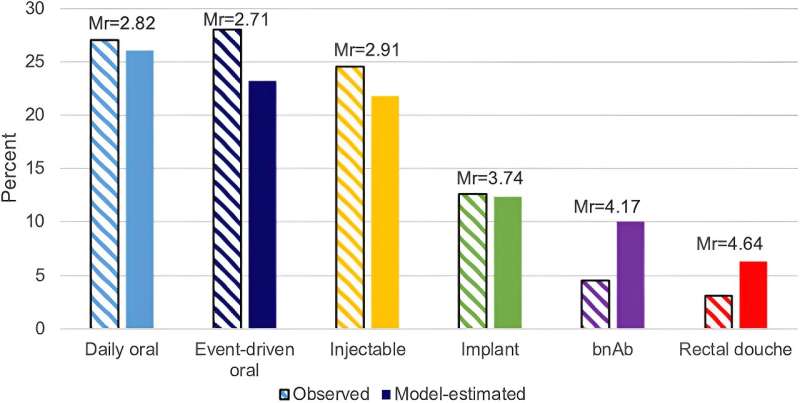This article has been reviewed according to Science X's editorial process and policies. Editors have highlighted the following attributes while ensuring the content's credibility:
fact-checked
trusted source
proofread
Study finds users prefer daily oral PrEP pill despite new options

When PrEP (pre-exposure prophylaxis), a drug that prevents HIV infection, was first approved by the FDA in 2012, it was a medical breakthrough that promised to drastically reduce HIV transmission. Traditionally, PrEP is administered via a pill that needs to be taken at the same time every day.
Now, there are even more delivery options. A new UConn study explores patient preference for the standard method and new options.
"The oral pill is very efficacious when people take it every day, and it really has the potential to curb HIV transmission in the country and play a key role in ending the HIV epidemic," Pablo Kokay Valente, assistant professor of allied health sciences in the College of Agriculture, Health and Natural Resources. "However, a lot of people who could benefit from PrEP are not accessing it."
The development of new PrEP delivery systems appears to be a promising way to reach patient populations who have not been using the daily oral pill. But whether or not patients will adopt taking them was unknown.
"We don't know if these products will be accepted." Valente says. "Will they actually fill the gap that the current forms of PrEP do not fill?"
Valente recently co-authored a study in the Journal of the International AIDS Society analyzing the preferences for taking PrEP among young men who have sex with men, one of the target populations for the intervention.
They found that study participants preferred daily oral PrEP over any other form.
"That was somewhat surprising," Valente says. "Because the promise of these new formulations is that they are allegedly easier to take, and many researchers and providers are excited that individuals who are in need of HIV prevention technologies would much rather take an injection every two months rather than a pill every day. But that's not what our study shows."
The study asked participants to choose between different forms of PrEP in a mobile survey. The survey listed information about each modality including efficacy, side effects, and cost.
The study included products that are already on the market (the daily oral pill; an on-demand oral pill that is taken before and after sexual intercourse; and a recently approved injection patients receive every two months), as well as products that are currently in development (an implant; broadly neutralizing antibodies which are delivered intravenously every two months; and a rectal douche that is used before sexual intercourse and provides protection for a few days afterwards).
The researchers also asked participants to rank different forms of PrEP using a ranked-choice approach which provided them with a better understanding of which products participants preferred than simply selecting their top choice.
The researchers found that the most important attributes for participants were the product's efficacy and potential side effects.
Overall, participants preferred forms of PrEP which have already been approved. Valente says this may be because they are more familiar with these modalities.
The researchers also found that people who experience food insecurity were less likely to prefer event-driven modalities, like the on-demand pill or the rectal douche. Younger people and people who are uninsured were less likely to prefer injectable or implant forms for reasons like cost, concerns about frequent visits, and lack of familiarity.
Overall, participants who were in a more stable socioeconomic position (those who were older, insured, and did not experience food insecurity) were more likely to prefer the new modalities.
"That's concerning, because part of the excitement around the new options is that they would reach people who are not being reached by current products," Valente says.
Valente says this kind of research is important as it allows researchers to identify potential patient populations who may be more likely to use a certain product.
"Understanding preferences is important because we need to create interventions that connect people to their preferred delivery method," Valente says.
What these findings showed, importantly, is that to do that, existing socioeconomic disparities need to be addressed before new products can take hold within currently underserved populations.
By 2017, 42% of white men who have sex with men who had clinical indications for PrEP had a prescription, compared to only 26% of Black men with the same indications. Black people account for 40% of new HIV infections in the U.S. despite making up only about 14% of the general population.
The high cost of new forms of PrEP also poses a significant barrier. Injectable PrEP, for example, currently costs $22,000 per person per year, and it is unclear if insurance companies will cover the new drug.
"If new medical developments are created and we do not pay attention to addressing existing inequities, these new technologies can fuel rather than address health inequities in society," Valente says. "Because people who will have access to them are the ones that are already connected. So instead of closing the gap, we can widen the gap."
More information: Katie B. Biello et al, Who prefers what? Correlates of preferences for next‐generation HIV prevention products among a national U.S. sample of young men who have sex with men, Journal of the International AIDS Society (2023). DOI: 10.1002/jia2.26096




















